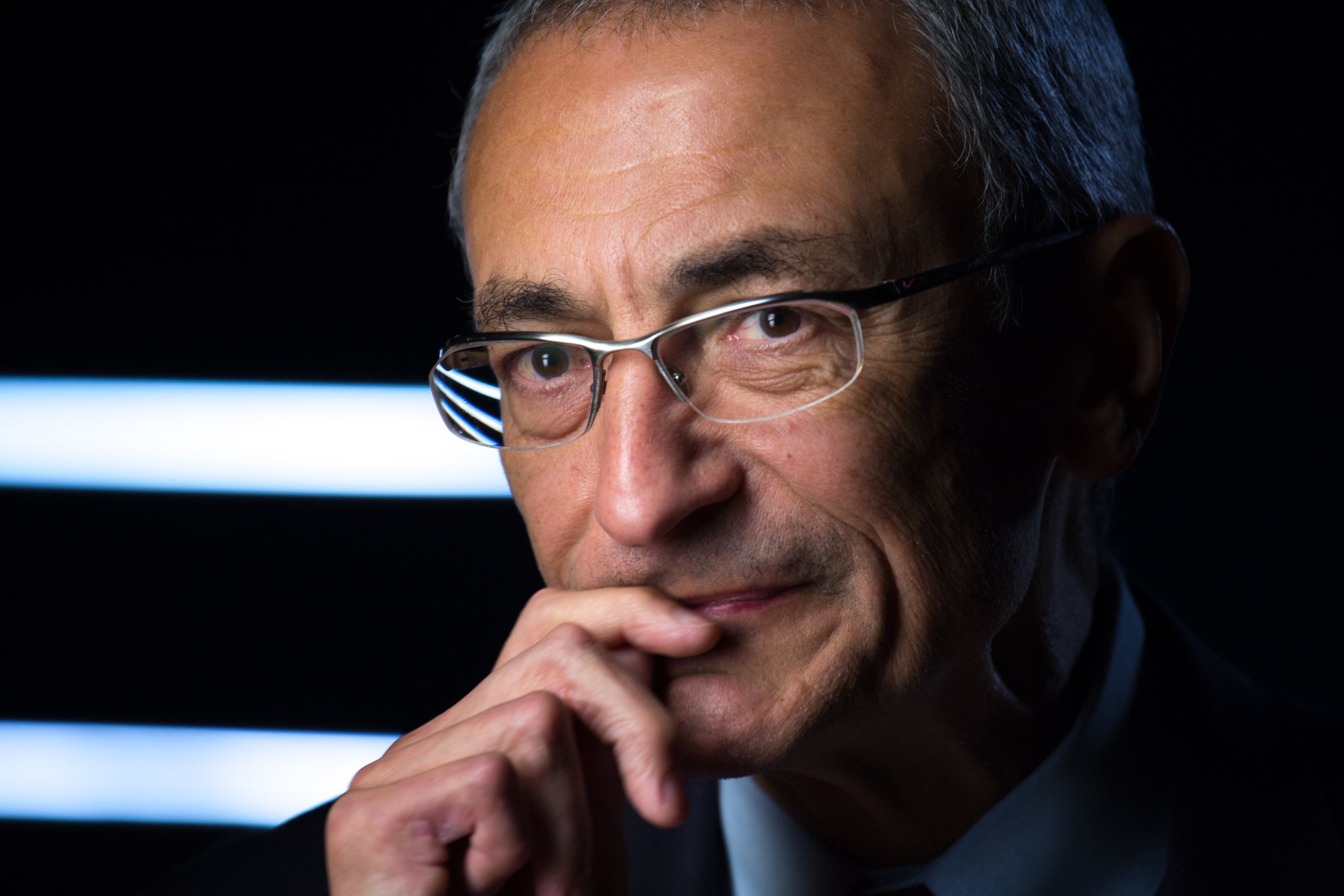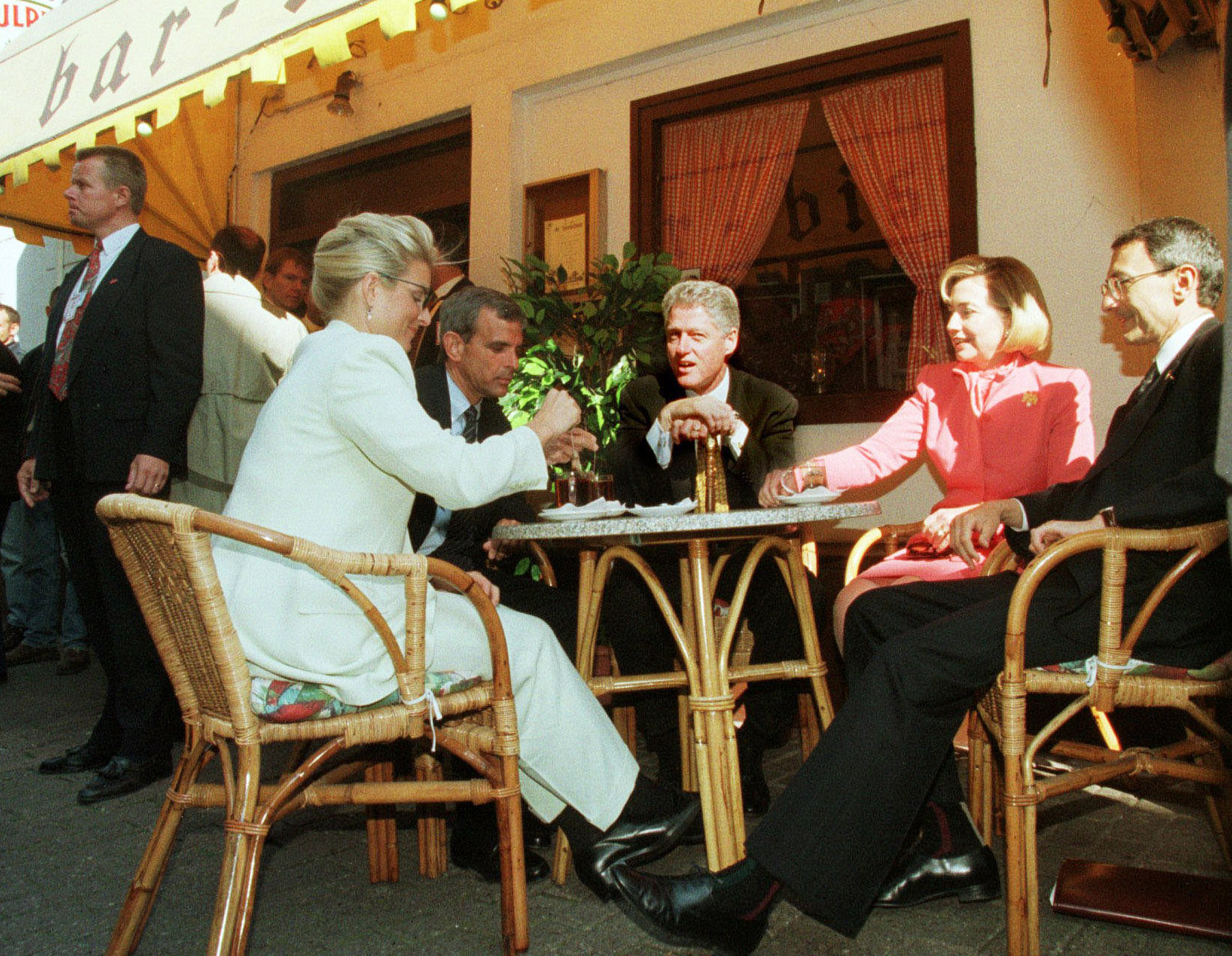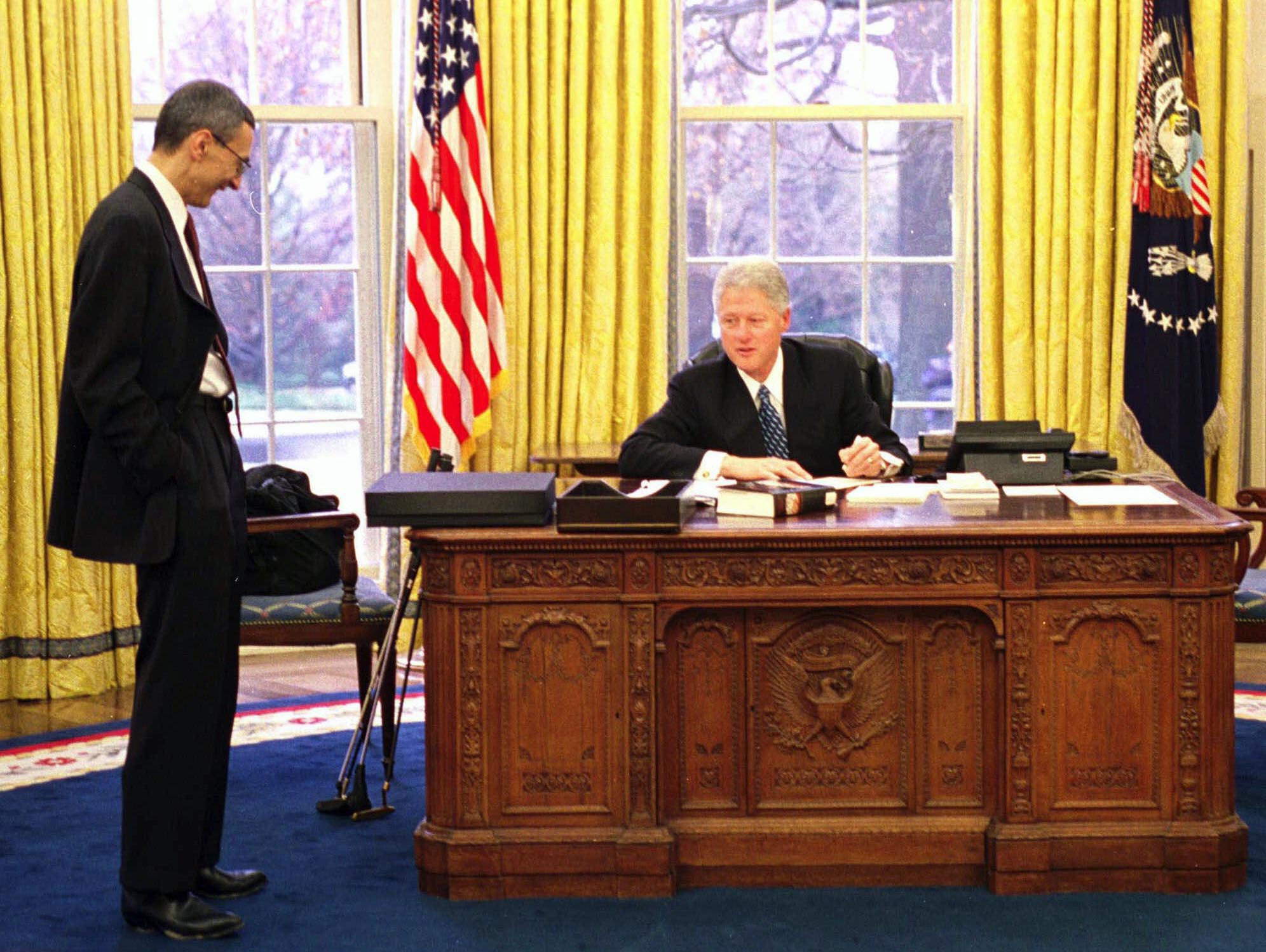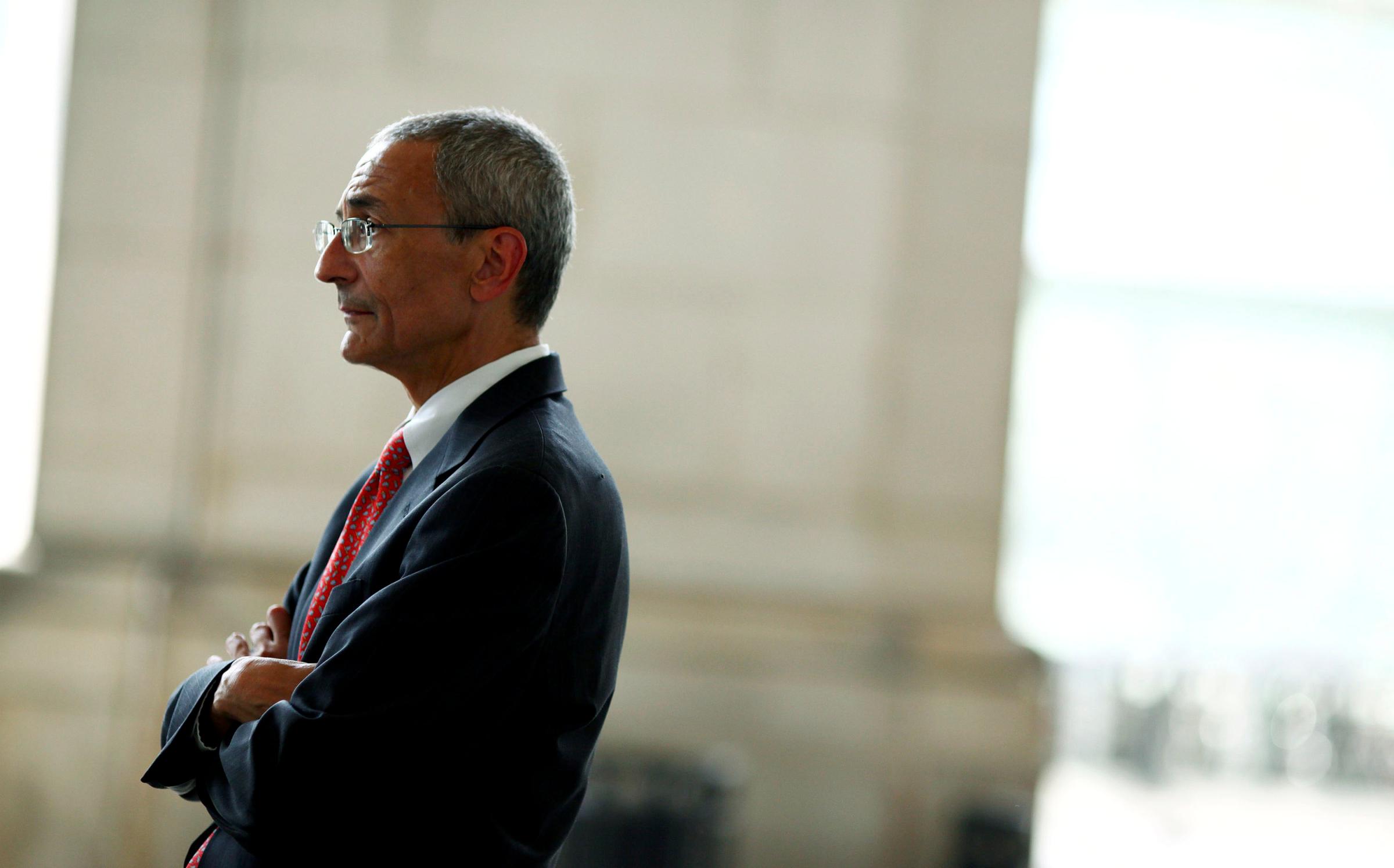
On the wall in his office at Hillary Clinton’s Brooklyn headquarters, campaign chairman John Podesta has an oil painting on loan from his lobbyist brother, who is an avid art collector. The image shows two men hunched over a dining room table, bearing knives and forks. On the table lays a man in a suit, who looks vaguely like Podesta. “It’s better to be the guy with the fork,” Podesta quips to his colleagues, if they ask about the image, “than the guy on the table.”
No one can argue that Podesta has been anyone’s meal this primary season, and to the extent he has succeeded in his role, the same can be said of his boss, Hillary Clinton. On Tuesday, with a win in Pennsylvania and four other states, she emerged as the presumptive Democratic nominee. Even ahead of Tuesday’s voting, rival Bernie Sanders needed to win two-thirds of the remaining delegates to catch up with Clinton’s lead. After Clinton’s Acela Corridor sweep, Sanders path to the nomination is all but closed.
At the center of Clinton effort has been Podesta, a commanding presence in Clinton’s orbit. When asked in Iowa just before the caucuses about how Podesta yields sticks and carrots, Campaign Manager Robbie Mook offered a puzzled look. “He’s John Podesta, you just do what he says,” Mook replied. It has been Podesta who has been charged with keeping the campaign coherent in the face of stumbles and setbacks, something that the 2008 Clinton operation failed to do. And it has been Podesta— part coach, part gatekeeper, judge and jury, director, fundraiser, policy wonk and strategist—who has overseen the Clinton effort.
A lifelong runner, he has meticulously plotted every relay leg of the effort, has been deputized to confront Clinton on her failures and missteps, charged with keeping the unruly bands of Clinton family and friends in line, and has been spotted in Clinton’s Brooklyn campaign headquarters standing on a chair with a bull horn, pumping up her 20-something staff. Podesta has also begun looking forward. For the general election, he asked Obama veteran Jennifer O’Malley Dillon months ago to start gaming out of a general election operation strategy versus various potential opponents—strategies she is already working with the Democratic National Committee to put in place should Clinton prevail—so they’d be ready for that turn when it came. Interviews with more than a dozen colleagues over the last several months reveal that Podesta is the first and last word on any issue, the primary and often only point of contact for much of exiled Hillary-land (Podesta stocked this campaign with professional campaigners, eschewing Clinton loyalists), everybody and nobody’s boss and simultaneously the campaign mascot and the wise man. Podesta is, in short, the man behind the Clinton campaign curtain.
Now he must lead next phase of the pivot to the general election, a process that began in earnest after Clinton won in South Carolina. On the charter plane out of Charleston that night, Podesta and Clinton toasted over a couple of blended Scotches. Neither are big whisky drinkers, but it was what they had on hand. For the first time, it was clear that the existential threat of Sanders had begun to fade. As is his style, Podesta did not let the toast linger, and promptly cut the celebration short: this isn’t over by a long shot, he warned. Don’t rest on your laurels. You still have many miles yet to go. Before they’d entered Tennessee airspace en route to Memphis, it was back to business.
THE ROOTS OF A PARTNERSHIP
In many ways this is the job Podesta has dreamed about for 20 years, though his first interaction with Hillary Clinton in her husband’s White House didn’t suggest it would ever happen. When Podesta was staff secretary, the then White House Chief of Staff Mack McLarty gave Podesta an extra job: handling the scandals of Bill Clinton’s first term. “You needed to isolate those as much as you can and keep the staff focused on the president and his agenda,” McLarty said. “I asked John to spear head that. He was superb.”

As part of that job, Podesta headed up the internal investigation on Travelgate, a scandal started when Hillary Clinton in May 1993 helped direct the firing of seven people from the travel office—usually non-political staff who continue through changes of Administrations. Ultimately, several investigations found the firings were inappropriate and most of the staff was reinstated. Podesta’s report was surprisingly critical of the First Lady’s role. Though no charges ever came of the scandal, the affair left Podesta in her doghouse. But the two policy wonks weren’t estranged for long. “When he left the White House he said to me he’d only go back for one job: Hillary’s chief of staff,” John’s brother Tony Podesta recalls. John Podesta declined to comment on the record for this story.
Podesta did eventually go back for other jobs, becoming Bill’s chief of staff in the final years—weathering Monica Lewinsky and impeachment with his friendships with both Clintons still in tact, that in itself a marvel. Though Podesta wouldn’t directly work for the Clintons again for years, he remained a key player in their orbit, publicly encouraging her to run for the Senate; helping raise money with his brother, with whom he co-founded Washington’s fourth largest lobbying firm, the Podesta Group; and then with the blessings and support of both Clintons launching his think tank, the Center for American Progress in 2003.

When Clinton first began preparing for her first run for President in late 2006, Podesta chose to stay on the sidelines. But he made his opinions known. At a meeting at Clinton’s Washington home in December 2006, Podesta weighed in on the then New York senator’s nascent campaign. He thought her message of strength and experience made her too much like Microsoft when the market wanted Apple—something shiny and new, according to two aides who were present. During the campaign, when Apple overtook Microsoft in market value, Podesta emailed the story around—it was one of the only comments he made during that campaign.
For Podesta, the lesson was clear: if she ran again, Clinton had to be seen to be fighting for every vote and taking the primary seriously. Her slogan this time is “Fighting For You.” Ahead of her July 2015 speech at the New School laying out her economic agenda, Podesta sat down with Clinton, her chief policy adviser Jake Sullivan and a couple of other staffers and thought about what her economic message should be, particularly knowing they’d be running against Sanders. Podesta advised her to pick things about which she was passionate—things like equal pay and childcare, say people present at the meetings. That speech has remained the heart of her message. “John is a very systematic thinker. One of the first things he did was look at operational strategy and look at lessons of 2008 and correct the mistakes,” Sullivan said.

CAMPAIGN FRUITION
That didn’t mean the second campaign would be easy. Clinton, who herself acknowledges is not a natural politician, has struggled to beat Sanders, a 74-year old self-described socialist from Vermont. Her choice as Secretary of State to use a private e-mail server rather than government email, and the subsequent Congressional and criminal investigations into whether that potentially exposed top secret information, haunted her and made many question her credibility. And she suffered from relateability problems. She admitted in 2013 that she hadn’t driven a car since 1996, the tens of millions raised by the Clinton Foundation were scrutinized, and Sanders rarely lets a day go by when he doesn’t remind voters about how Wall Street banks paid her hundreds of thousands of dollars to give speeches to their elite ranks.
The photo finish in Iowa shouldn’t have been so expensive. She shouldn’t have lost New Hampshire by 20 points, or Michigan at all. But this was the race that Podesta had planned for, for better and worse. Early on, he led the charge to keep everyone else in line, even as failures and setbacks strained the system. When Clinton’s favored attack dog, David Brock began raising questions about Sanders’ health, Podesta quickly shut the news down with a public Tweet. “Chill out. We’re fighting on who would make a better President, not on who has a better Physical Fitness Test.” When someone in the Clinton circle put out word to Politico that staff might reorganize, it was Podesta who similarly restored order. “There is zero truth to what you may be reading,” he said. “It’s wrong.”
Podesta made a conscious effort to course correct this campaign. Her first presidential campaign was hamstrung by back biting and leaking, as staffers lobbied for their strategies in the press. She spent too much money on media and neglected her field and technology teams. That staff was a coterie of longtime Clinton friends and aides picked more for their loyalty than their competence, leading her to change campaign managers mid-race in a bid to reset but her victories were never strong enough to allow her to catch up with Barack Obama’s delegate lead. Podesta this time around invested heavily in field and technology early on, two areas where Clinton felt Obama had out-organized her. And only a handful of staffers worked for Clinton before this campaign, leaving the management of decades of Clinton insiders almost exclusively to Podesta. He also changed the tone and message of the campaign, encouraging Clinton to play up the historic nature of her campaign and speak often about women’s issues and eschewing big rallies, no venues where Clinton shines, for intimate roundtables.
At a Clinton campaign senior staff retreat over the holidays in late 2015, each person was asked to bring an object that had some symbolic value to him or her. Podesta brought a snap bracelet from a relay race in Toronto. The campaign chair told the group about how in this particular race, one of his teammates had been shot in the leg running in the middle of the night. It turned out only to be by a pellet gun, but despite the drama all the runners finished the race. “John said it was a lesson about how we’ve got to take care of each other, no matter how bad things get and also to always keep looking at the finish line—though hopefully none of us will get shot,” said Mook. Podesta gave Mook the bracelet, and he carries it with him everywhere.

EAT OR BE EATEN
As Clinton makes the pivot to the general election, she is faced with the challenge of uniting her party. Sanders in an MSNBC town hall on Monday hinted that for his endorsement, he’d like to see Clinton embrace single payer health care and stronger stances on climate change, to which Clinton scoffed in her own town hall that winning means something. But the truth is, she will need Sanders’ help to unite and excite the party base around her, particularly among young and progressive voters.
She also has historically high negative polls ratings: a CBS poll in March found her underwater with voters by 21 percentage points with just 31% approving of her and 52% disapproving. Sure, Clinton benefits from the increasingly likely nomination on the Republican side of Donald Trump, who is even more disliked than she is: the same CBS poll found Trump with a 24% approval rating to a whopping 57% disapproval for a net deficit of 33 percentage points. The other Republican in the running, Texas Sen. Ted Cruz, also suffers from more American disapproval than approval.
As a result, the general election portends to be one of the nastiest in history, with Trump already accusing Bill Clinton of preying on women akin to Bill Cosby. Not to mention, the ever-hanging threat of indictments relating to the e-mail scandal. Yet through it all, Podesta has stuck to his mantra, seeking to stay the aggressor not the victim: like any good runner he has mapped out the course prepared for the hills and challenges.
The day of the Nevada caucuses found Podesta was at his brother’s house in Washington, overseeing a fundraiser for wealthy supporters. Podesta—a gourmet chef who often jokes he’d be fat if it weren’t for all the running—cooked for 200, part of a series of fundraisers where he and a celebrity chef cooked for donors. This time, he was whipping up Sunday brunch with Carla Hall, co-host of ABC’s The Chew. The message of the painting in his Brooklyn office was not far from his mind. “I’m behind the counter,” he half joked to the crowd, according to two people present, “because I don’t want to be the meal.”
More Must-Reads from TIME
- Where Trump 2.0 Will Differ From 1.0
- How Elon Musk Became a Kingmaker
- The Power—And Limits—of Peer Support
- The 100 Must-Read Books of 2024
- Column: If Optimism Feels Ridiculous Now, Try Hope
- The Future of Climate Action Is Trade Policy
- FX’s Say Nothing Is the Must-Watch Political Thriller of 2024
- Merle Bombardieri Is Helping People Make the Baby Decision
Contact us at letters@time.com